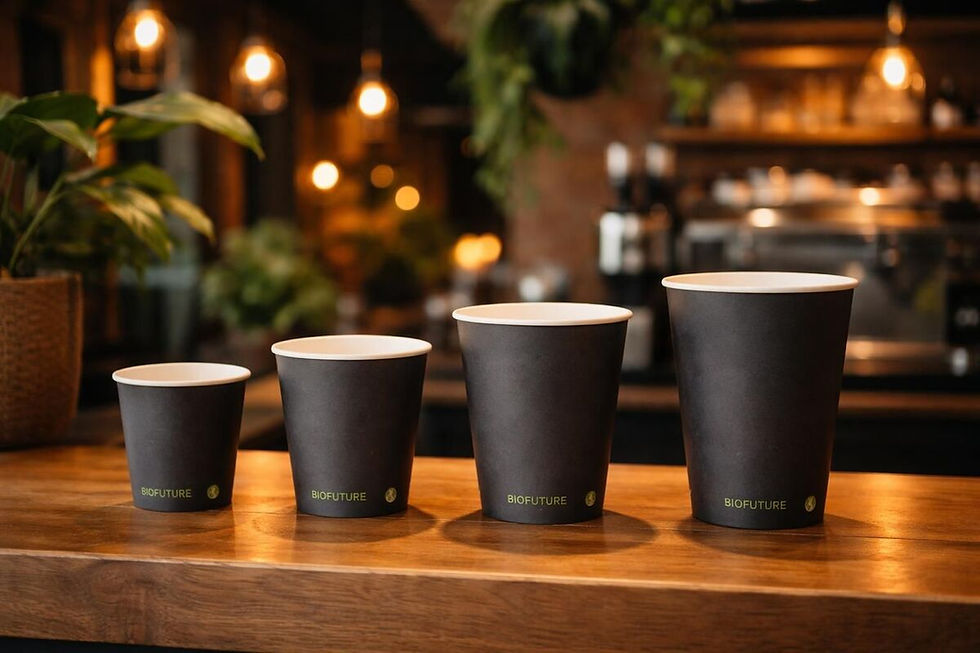Microplastics in the Kitchen: What You Need to Know
- Biofuture

- Jul 3, 2025
- 3 min read

Are microplastics hiding in your kitchen? From cling film to takeaway containers, many everyday items shed microscopic plastic particles that end up in your food, your body, and the environment.
At Biofuture, we believe switching to compostable alternatives isn’t just about reducing waste. It’s about protecting your health and making sustainability simple - stepping away from traditional plastics and leaning into compostable plastics that excel in environmental and health outcomes. Here's what you need to know.
What Are Microplastics (and Why Are They in Your Kitchen?)
Microplastics are plastic particles smaller than 5mm. They form when larger plastic items break down through heat, friction, or sunlight. These particles are now found everywhere, from oceans and soil to bottled water and kitchen cupboards.
Even if you shop plastic-free, some of the biggest sources are still in your home.
Common Kitchen Items That Release Microplastics
Here’s where microplastics often enter your kitchen and your food:
1. Plastic Cling Film When stretched or heated, cling film can shed microplastic fragments. Microwaving food wrapped in plastic or covering hot leftovers makes this even more likely.
2. Plastic Food Containers Scratched, worn, or microwaved containers can release microplastics and chemical additives like BPA directly into your food.
3. Single-Use Takeaway Packaging Plastic takeaway boxes, lids, and cutlery often break down under heat or contact with greasy foods. These materials aren’t designed for reuse or reheating, and many are not truly food-safe.
4. Resealable Plastic Food Bags Used daily for snacks, sandwiches, and leftovers, resealable bags may break down over time, especially when frozen, microwaved, or reused, allowing microplastics to transfer to the food inside.
Are Microplastics Harmful?
Research is still ongoing, but early findings are concerning. Microplastics may:
Disrupt hormones
Trigger inflammation
Accumulate in organs and tissues
Carry chemical additives linked to fertility issues, cancers, and developmental problems
Studies suggest that the average person consumes tens of thousands of microplastic particles each year, often without realising it.
Compostable Alternatives That Don’t Compromise
Plastic isn’t your only option. At Biofuture, we make kitchen and packaging essentials that perform like the products you're used to, without the hidden health risks or long-term pollution.
Our compostable alternatives include:
Plant-based Cling Film Safe for food and microwave use. It wraps like plastic but breaks down naturally and leaves no harmful residue.
Kraft Takeaway Boxes Strong, leak-resistant, and made without plastic coatings. Ideal for hot and cold food.
Compostable Resealable Bags A safer way to store snacks, sandwiches, and leftovers. Durable, practical, and certified compostable.
Compostable Cutlery Sets Perfect for events, takeaways, or picnics. Designed for convenience and built for sustainability.
Every Biofuture product is certified to break down safely without contributing to microplastic pollution. No greenwashing, no compromises.
If you're interested in finding more ways to reduce overall plastic use in the kitchen, take a look at our article on eco-friendly kitchen swaps for actionable changes you can make today.
Closing the Loop with Biofuture
Our mission is to make compostable packaging the standard, not the exception. That means offering products that are:
Simple to use
Affordable for households and small businesses
Backed by trusted certifications like TÜV Austria, BPI, and DIN CERTCO
Designed to work with UK food waste and composting systems
Through partnerships with organisations like Grundon Waste and One Tree Planted, we help ensure your sustainable choices make a measurable impact.
Rethink Plastic, Starting in Your Kitchen
Microplastic pollution often starts at home. But so does the solution. Swapping out common plastic items for certified compostable alternatives is one of the most effective ways to reduce your exposure and protect the planet.
If you're ready to rethink plastic in your kitchen, we’re here to help.




Comments